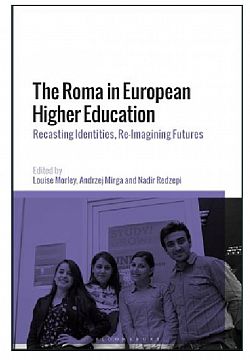August 2020
CHEER member, Mariam Attia (Lecturer in International Teacher Education), contributed to the publication Multilingual Online Academic Collaborations As Resistance: Crossing Impassable Borders, edited by Giovanna Fassetta, Nazmi Al-Masri and Alison Phipps. The book details online collaborations between universities in Europe, the USA and Palestine. The chapters recount the challenges and successes of online collaborations which promote academic connections and conversations with the Gaza Strip (Palestine) and forge relationships between individuals, institutions and cultures. Mariam's contribution is to Chapter 6: Chapter 6: 'Gaza Teaches Arabic Online: Opportunities, Challenges and Ways Forward'.
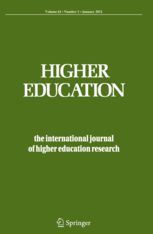 Louise Morley, Paul Roberts and Hiroshi Ota's article 'The affective assemblage of internationalisation in Japanese higher education' was published in the journal Higher Education. The article was one of the outcomes of the CHEER project Higher Education, Knowledge Exchange and Policy Learning in the Asian Century.
Louise Morley, Paul Roberts and Hiroshi Ota's article 'The affective assemblage of internationalisation in Japanese higher education' was published in the journal Higher Education. The article was one of the outcomes of the CHEER project Higher Education, Knowledge Exchange and Policy Learning in the Asian Century.
July 2020
Louise Morley was the introductory speaker in the webinar, COVID-19, Women and Governments in the Department for Gender and Sexualities, University of Malta on 13 July. She presented 'Which Inequalities Have Surfaced/ Been Reinforced by the Pandemic Crisis?'
___________________________________________________________
The Roma in European Higher Education: Recasting Identities, Re-Imagining Futures
We are delighted to announce the publication of our book from the HEIM Project (Higher Education, Internationalisation and Mobilities).
About 'The Roma in European Higher Education'
"Today, between 10 and 12 million Roma live in Europe, comprising the continent's largest ethnic minority. However, only 1% participate in higher education. Although the Roma are widely dispersed across Europe and beyond, they face similar social, political and economic challenges throughout the continent. A major site of struggle has been access, attendance and achievement in the education sector for Gypsies, Roma and Travellers (GRT). This groundbreaking text explores the Roma in higher education, a topic of great importance since higher education is considered to be a significant pathway out of poverty and to social mobility."
"Why are participation rates so low? What are the barriers and what are the enablers? This edited collection brings together authors from diverse national and organisational locations, activists and policymakers from Canada, Chile, Finland, Greece, Hungary, Macedonia,Poland, Serbia, the UK and the USA. They share and critically analyse contemporary know;ledge on research, policies, practices and interventions to promote Roma participation in higher education in a range of European locations. They cover key topics, including the representation of Roma communities as living on the margins, but also racism, anti-Gypsyism, Romaphobia, hate crimes and discrimnatory practices. The book offers insights into how to fight discrimination and re-distribute higher educational opportunities without objectifying the Roma or representing these rick and diverse communities merely as powerless victims."
Contents
Notes on Contributors vii
Introduction: Recasting Identities, Re-Imagining Futures 1
PART 1: Theories, Resources, Policy and Professional Interventions for Challenging Roma Exclusion from Higher Education
1. Thinking Differently about the Roma in Higher Education: Beyond Sex, Slums and Special Schools, and Towards Epistemic Inclusion Louise Morley
2. The Roma in European Higher Education: Explaining the Educational Gap of Roma in Higher Education Andrzej Mirga and Nadir Redzepi
3. The European Discourse of Inclusion Policies for Roma in Higher Education: Racialized Neoliberal Governmentality in Semi-Peripheral Europe Daniel Leyton
4. Phaori si duje xulajenqe te keres buti (Nobody Can Serve Two Masters) Higher Education Expansion, Roma Access and Neoliberal Globalization Spyros Themelis
5. Capability Strengthening: Roma as Knowledge Producers Paul Roberts
6. Creating Knowledge about the Roma in Higher Education Iulius Rostas and Simona Torotcoi
PART 2: Focus on Europe: Examples of What is going on in Greece, the Nordic Countries, Serbia and Spain
7. The Roma in Spanish Higher Education: Lights and Shades after Three Decades of National Plans for Roma Inclusion Teresa Padilla-Carmona, José González-Monteagudo, and Sandra Heredia-Fernández
8. Higher Education in Nordic Roma and Traveller Policy Documents – Analysing Silences Jenni Helakorpi and Ulpukka Isopahkala-Bouret
9. Widening Access of the Roma in the Global Knowledge Economy: The Case of Serbia Tanja Jovanovic
10. Greek Roma in Higher Education: How Did They Get There? Panagiota Gkofa
December 2019
CHEER presented the symposium Critical Assemblages: Creating New Political Imaginaries and Contesting the Neoliberal Global Knowledge Economy at the SRHE International Conference on Research into Higher Education on 11 December. Seven papers were presented:
- Women Leaders in Finnish Universities: Doing/Undoing Gender?
Louise Morley and Rebecca W. B. Lund - Disposable Academics? Resisting the Normalisation of Academic Precarities
Charlotte Morris - Student Visas: Technologies of Control?
Aisling Tiernan - Trespassing and Transgression: Arab Masculinities and Gender Equality Research
Yasser Kosbar - Offshoring Responsibility: Transnational Higher Education and Risk in the Neoliberal Imaginary
Lee Rensimer - Teacher Education in a Context of Military Occupation and Siege: The Power of Purpose
Mariam Attia - Mental Health: Affect and the Individual
Paul Roberts
See also ABSTRACTS for the above presentations.
The symposium was attended by over 50 delegates.
SRHE 2019
November 2019
Louise Morley made the keynote presentation Why Women Should Lead Research? at the GenderAction Conference in Malta. The GENDERACTION project has been funded by Horizon 2020 and aims to advance gender equality in the European Research area at policy level through analysis, networking, capacity building and sharing working practices. An objective is also to provide strategic policy advice on gender equality in research and innovation.
The Malta conference was attended by policymakers, gender equality projects leaders and academics from the EU and from third countries.
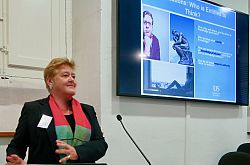

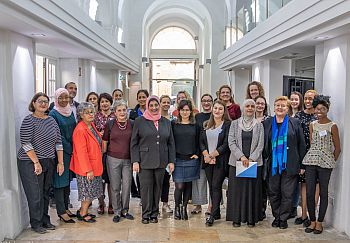
October 2019
Louise Morley visited Tampere University to present the guest lecture Women Leaders in Finnish Universities: Navigating Neoliberalism, Narrating Neuroliberalism and Nurturing New Imaginaries. The invited lecture was part of the Institute for Advanced Social Research seminar series and discussed findings from Louise's research with Rebecca Lund on women leaders in Finnish higher education. Louise also participated in research meetings with Professor Rebecca Boden to establish new research links between CHEER and the Centre for New Social Research at Tampere University.
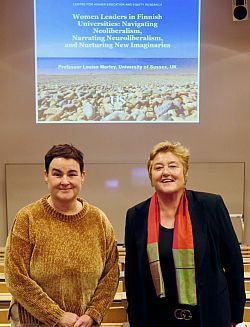

September 2019
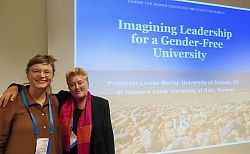 ECER Conference, Hamburg
ECER Conference, Hamburg
Louise Morley presented - with Dr Rebecca Lund - the research she has conducted on women leaders in higher education during her visiting professorship at Tampere University in Finland at the European Conference for Educational Reseachers (ECER) in Hamburg. The presentation, 'Imagining Leadership for a Gender-Free University', was part of the symposium 'Gender, Knowledge and Leadership in the Global Academy' with other presentations by Julie Rowlands and Jill Blackmore (Deakin); Kirsten Locke and Sue Wright (Aarhus) and Ana Luisa Munoz-Garcia (Pontificia Universidad Católica de Chile).


August 2019
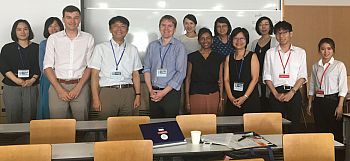 By Paul Roberts, CHEER doctoral researcher
By Paul Roberts, CHEER doctoral researcher
It was an honour to host the CHEER Symposium ‘Hidden Narratives of Internationalisation’ alongside Professor Hiroshi Ota (Professor and Director, Hitotsubashi University Global Education Program) and Suvendrini Kakuchi (a journalist for University World News) at the World Education Research Association Conference in Tokyo.
At the symposium I was delighted to be reacquainted with Yuko Ryan (Associate Professor, Shizuoka University) who had previously met with me to discuss Doctoral Education at the University of Sussex. We discussed ideas for future collaboration, in relation to the internationalisation of doctoral students and their subsequent employment in Japan. I was also able to meet up with Thomas Brotherhood a doctoral candidate from Oxford covering similar research and Dr Yangson Kim from Hiroshima University. The potential for future collaboration and joint publications is very exciting.
For more information on the publications behind the presentations see:
Morley, L., Leyton, D. & Hada, Y. (2019): 'The Affective Economy of Internationalisation: Migrant academics in and out of Japanese Higher Education', Policy Reviews in Higher Education, 3:1, 51-74, DOI: 10.1080/23322969.2018.1564353.
Otta, H. & Horiuchi, K.: 'Internationalization through English-Medium Instruction in Japan: Challenging a Contemporary Dejima', In D. Proctor & L. E. Rumbley (Eds.), The Future Agenda for Internationalization in Higher Education. Routledge pp.15-27 2018 ISBN 1138289795
July 2019
 Dr Hande Eslen-Ziya, Associate Professor of Sociology at Stavanger University, Norway, visited CHEER to discuss possible research collaborations investigating gender in higher education in Europe. Hande's research interests focus on gender and social inequalities, transnational organisations and social activism, and she has a substantial portfolio of research in this field. CHEER looks forward to collaboration with Hande and colleagues in Norway.
Dr Hande Eslen-Ziya, Associate Professor of Sociology at Stavanger University, Norway, visited CHEER to discuss possible research collaborations investigating gender in higher education in Europe. Hande's research interests focus on gender and social inequalities, transnational organisations and social activism, and she has a substantial portfolio of research in this field. CHEER looks forward to collaboration with Hande and colleagues in Norway.
June 2019
CHEER Experts' Knowledge Exchange Seminar: Internationalising Higher Education in Japan
Experts from MEXT the OECD, and the UUK and scholars, university leaders, members of professional services, and doctoral researchers participated in discussions on the findings from the CHEER Research Project: Higher Education, Knowledge Exchange and Policy Learning in the Asian Century: A UK/Japanese Partnership.
We were delighted to welcome our research parters from Japan - Professor Yumiko Hada and Dr Ryo Sasaki. We were also honoured that colleagues from around the globe joined us for the event: Professor Greg Poole, from Doshisha University, Japan, Dr Carolina Guzman from the University of Chile, and Ms Shizuka Kato from the OECD, Paris, and our CHEER Associates Professor Carole Leathwood and Dr Terri Kim.
Professor Hiroshi Ota from Hitotsubashi University made the keynote presentation: 'Internationalization and International Students in Japan'.
This was followed by a presentation on the findings from the research on migrant academics by Louise Morley and Yumiko Hada: 'The Affective Economy of Internationalisation: Migrant Academics in and out of Japanese Higher Education'.
After lunch, Paul Roberts and Mariam Attia presented their findings on international doctoral researchers in Japan: 'Internationalisation of Doctoral Education in Japan: Implications for Researcher Development'.
Participants worked in groups to identify the following Impact Action Points:
- 1. Deep or Surface Internationalisation?
- To adopt a vocabulary of mainstreaming internationalisation and encourage higher education institutions and agencies to review all services and practices in relation to the aims of internationalisation e.g. the curriculum, pedagogies, communications, mentoring, practical matters, the built environment, recruitment and selection.
- This process could draw on the work on internationalisation undertaken by some Japanese universities e.g. Ritsumeikan Asia Pacific University, and the extensive global documentation produced for gender mainstreaming by the United Nations; the European Commission; the Gender Secretariat in Sweden e.g. toolkits, guidelines for good practice.
- 2. Language
- To provide on-line pre-arrival courses in the Japanese language for international students and faculty.
- These courses could potentially be a requirement of mobility funding for doctoral researchers from the Japanese government.
- 3. Doctoral Researchers
- Japanese universities/ MEXT to review/ produce documentation that codifies entitlements, aims, rights and responsibilities for doctoral researchers. In the case of those supported by scholarships, this could also include expectations of future connection and activity. The documentation to be made available in Japanese and English.
- 4. To set up fora in which Japan and the UK could exchange best practices to support doctoral researchers and their wellbeing e.g. supervision; skill development; infrastructures for people in crisis. This could involve work with the Japan Association of National Universities, the UK Council for Graduate Education, and UUK.
- 5. Supporting Migrant Academics
- To utilise the Training Module Internationalisation in Higher Education: Practical Guidance to support work with migrant academics. This module is available in English and in Japanese.
- To support the UUK in the development of a UK-Japan Mobility Guide to support UK and Japanese universities to exchange students.
- 6. Higher Education Pedagogy
- To develop courses in higher education pedagogies in Japanese universities.
These Action Points will be taken up with the following Stakeholders
1. UUK
2. MEXT
3. OECD
4. Japan Association of National Universities
5. The UK Council for Graduate Education
